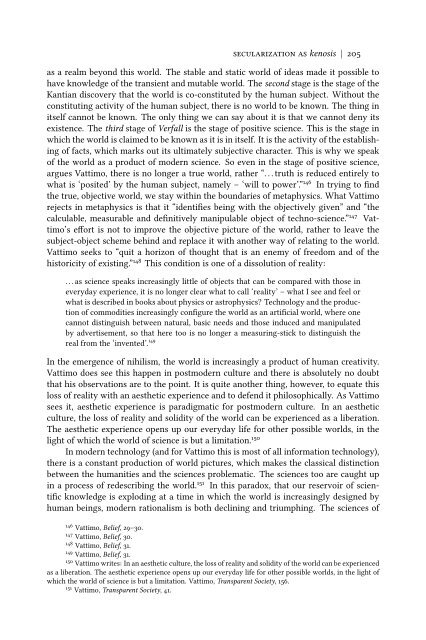Secularization as Kenosis
Secularization as Kenosis
Secularization as Kenosis
Create successful ePaper yourself
Turn your PDF publications into a flip-book with our unique Google optimized e-Paper software.
secularization <strong>as</strong> kenosis | 205<br />
<strong>as</strong> a realm beyond this world. The stable and static world of ide<strong>as</strong> made it possible to<br />
have knowledge of the transient and mutable world. The second stage is the stage of the<br />
Kantian discovery that the world is co-constituted by the human subject. Without the<br />
constituting activity of the human subject, there is no world to be known. The thing in<br />
itself cannot be known. The only thing we can say about it is that we cannot deny its<br />
existence. The third stage of Verfall is the stage of positive science. This is the stage in<br />
which the world is claimed to be known <strong>as</strong> it is in itself. It is the activity of the establishing<br />
of facts, which marks out its ultimately subjective character. This is why we speak<br />
of the world <strong>as</strong> a product of modern science. So even in the stage of positive science,<br />
argues Vattimo, there is no longer a true world, rather “. . . truth is reduced entirely to<br />
what is ‘posited’ by the human subject, namely – ‘will to power’.” 146 In trying to find<br />
the true, objective world, we stay within the boundaries of metaphysics. What Vattimo<br />
rejects in metaphysics is that it “identifies being with the objectively given” and “the<br />
calculable, me<strong>as</strong>urable and definitively manipulable object of techno-science.” 147 Vattimo’s<br />
effort is not to improve the objective picture of the world, rather to leave the<br />
subject-object scheme behind and replace it with another way of relating to the world.<br />
Vattimo seeks to “quit a horizon of thought that is an enemy of freedom and of the<br />
historicity of existing.” 148 This condition is one of a dissolution of reality:<br />
. . . <strong>as</strong> science speaks incre<strong>as</strong>ingly little of objects that can be compared with those in<br />
everyday experience, it is no longer clear what to call ‘reality’ – what I see and feel or<br />
what is described in books about physics or <strong>as</strong>trophysics? Technology and the production<br />
of commodities incre<strong>as</strong>ingly configure the world <strong>as</strong> an artificial world, where one<br />
cannot distinguish between natural, b<strong>as</strong>ic needs and those induced and manipulated<br />
by advertisement, so that here too is no longer a me<strong>as</strong>uring-stick to distinguish the<br />
real from the ‘invented’. 149<br />
In the emergence of nihilism, the world is incre<strong>as</strong>ingly a product of human creativity.<br />
Vattimo does see this happen in postmodern culture and there is absolutely no doubt<br />
that his observations are to the point. It is quite another thing, however, to equate this<br />
loss of reality with an aesthetic experience and to defend it philosophically. As Vattimo<br />
sees it, aesthetic experience is paradigmatic for postmodern culture. In an aesthetic<br />
culture, the loss of reality and solidity of the world can be experienced <strong>as</strong> a liberation.<br />
The aesthetic experience opens up our everyday life for other possible worlds, in the<br />
light of which the world of science is but a limitation. 150<br />
In modern technology (and for Vattimo this is most of all information technology),<br />
there is a constant production of world pictures, which makes the cl<strong>as</strong>sical distinction<br />
between the humanities and the sciences problematic. The sciences too are caught up<br />
in a process of redescribing the world. 151 In this paradox, that our reservoir of scientific<br />
knowledge is exploding at a time in which the world is incre<strong>as</strong>ingly designed by<br />
human beings, modern rationalism is both declining and triumphing. The sciences of<br />
146 Vattimo, Belief, 29–30.<br />
147 Vattimo, Belief, 30.<br />
148 Vattimo, Belief, 31.<br />
149 Vattimo, Belief, 31.<br />
150 Vattimo writes: In an aesthetic culture, the loss of reality and solidity of the world can be experienced<br />
<strong>as</strong> a liberation. The aesthetic experience opens up our everyday life for other possible worlds, in the light of<br />
which the world of science is but a limitation. Vattimo, Transparent Society, 156.<br />
151 Vattimo, Transparent Society, 41.










